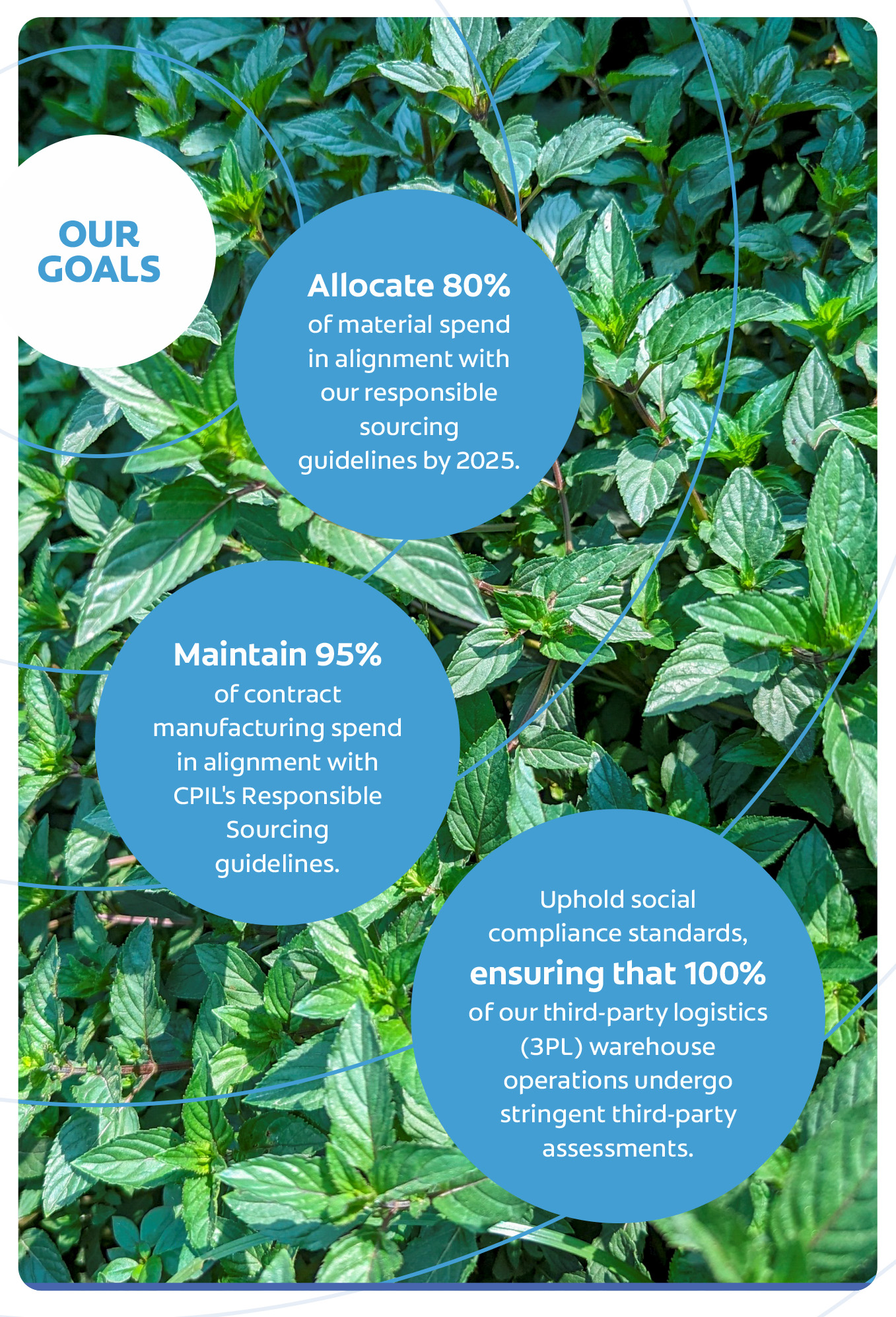Statutory Section
At CPIL, sustainable sourcing is a powerful enabler of long-term value creation for people, planet, and performance. This year, we continued to reimagine our supply chain to be more responsive and responsible, ensuring that every material we source, every partner we engage with, and every process we refine contribute to a more ethical, efficient, and environmentally conscious ecosystem.
We collaborated closely with our suppliers to ensure responsible sourcing of materials and to uphold fair treatment and safe working conditions throughout our supply chain. Whether it's choosing certified materials, supporting local suppliers, or ensuring there is no child or forced labor, we continue to hold ourselves and our partners to high standards.
With a multitude of suppliers across raw materials, packaging, logistics, and more, we are using innovation, data, and strong partnerships to raise standards across the board. These efforts are not just about meeting rules or ticking boxes. They come from our core belief that doing the right thing for people and the planet is also the right thing for business.
We organize our sourcing strategy to stay true to our values and keep sustainability at the core of how we work. At the same time, we optimize every step of the process, from supplier management to smarter logistics and transport. This helps us reduce our environmental impact, improve efficiency, and outperform competitors driving a positive change that moves the industry forward.
Globally, Colgate-Palmolive Company's sustainable sourcing strategy focuses on:
| Industry-wide transformation |
Expanded use of certified materials and traceability |
Deeper engagement with suppliers and stakeholders |
Increased external communications |


Responsible sourcing lays the foundation and helps us manage our supply chain with a focus on long-term sustainability.
We make it a priority to work with local suppliers whenever possible. This helps us lower our environmental impact and shorten lead times. With 75% of our direct suppliers based locally, we are also helping create jobs and strengthen the communities we operate.
We have collaborated with over 2,200 suppliers for raw materials, packaging materials, logistics support, marketing, and a multitude of other offerings.
We also ensure that our suppliers adhere to rigorous ethical standards, including no child labor. Through comprehensive supplier vetting processes and ongoing monitoring, we verify that all partners uphold the highest ethical principles.
No instances of child labor
or forced labor were reported
in FY 2024-25.
Additionally, no Environmental
or Social impacts have been
identified.

We continue to assess and manage supplier risks more thoughtfully, because where something comes from matters. We have strengthened our approach on how we identify and address social, ethical, and environmental risks in our sourcing practices. From palm oil and soy to paper-based packaging, we are making sure that every material is sourced responsibly and aligns with our global standards, while staying rooted in local impact.
Through our Supplier Responsible Sourcing Assessment (SRSA) program, we ask selected suppliers and partners to complete a self-assessment covering key areas like labor rights, worker safety, environmental practices, and ethical business conduct.
We then use a risk scorecard to evaluate their responses. If a supplier is identified as high-risk, we take the next step with a third-party audit to ensure they meet our standards and operate responsibly.
The sourcing of all commodities is covered by the Group-level policies created by our parent, Colgate-Palmolive Company.

Our endeavor to responsibly
source palm oil is guided by the
Policy on Responsible and
Sustainable Sourcing of Palm Oil.
This policy outlines our
commitments and expectations
for our palm oil suppliers and
includes the following elements:
We guide our efforts through the
pulp and paper packaging section
of our No Deforestation policy,
which outlines our expectations
for how we source these materials.
The guiding principles that
underpin our approach include:
